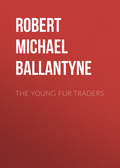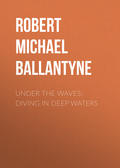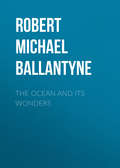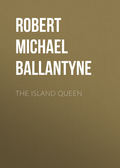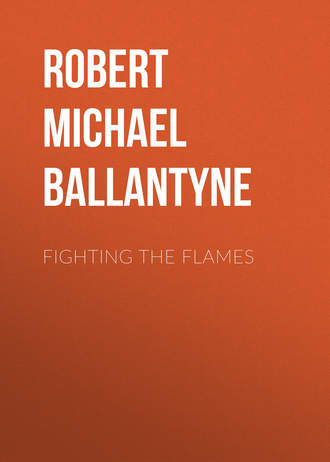
Robert Michael Ballantyne
Fighting the Flames
“Don’t you think, Fred, that time will soften your father?”
“No, I don’t think it. On the contrary, I know it won’t. He is a good man; but he has an iron will, which I never saw subdued.”
“Then, my dear Fred, I advise you to consider the propriety of throwing your palette and brushes into—”
“My dear John, I did not come here for your advice. I came for your sympathy.”
“And you have it, Fred,” cried Barret earnestly. “But have you really such an unconquerable love for painting?”
“Have I really!” echoed Fred. “Do you think I would have come to such a pass as this for a trifle? Why, man, you have no idea how my soul longs for the life of a painter, for the free fresh air of the country, for the poetry of the woods, the water, and the sky, for the music of bird and beast and running brook. You know the true proverb, ‘Man made the town; but God made the country!’”
“What,” asked Barret, “would become of the town, if all men thought as you do?”
“Oh! John Barret, has town life so marred your once fine intellect, that you put such a question in earnest? Suppose I answer it by another: What would become of the country if all men thought and acted as you do?”
Barret smiled and smoked.
“And what,” continued Auberly, “would become of the fine arts if all men delighted in dirt, dust, dullness, and desks? Depend upon it, John, that our tastes and tendencies are not the result of accident; they were given to us for a purpose. I hold it as an axiom that when a man or a boy has a strong and decided bias or partiality for any particular work that he knows something about, he has really a certain amount of capacity for that work beyond the average of men, and is led thereto by a higher power than that of man. Do not misunderstand me. I do not say that, when a boy expresses a longing desire to enter the navy or the army, he has necessarily an aptitude for these professions. Far from it. He has only a romantic notion of something about which, experimentally, he knows nothing; but, when man or boy has put his hand to any style of work, and thereafter loves it and longs after it, I hold that that is the work for which he was destined, and for which he is best suited.”
“Perhaps you are right,” said Barret, smoking harder than ever. “At all events, I heartily sympathise with you, and—”
At this point the conversation was interrupted by a loud burst of whistling, as the street-door opened and the strains of “Rule Britannia” filled the entire building. The music was interrupted by the sudden opening of another door, and a rough growl from a male voice.
“Don’t get waxy, old feller,” said the performer in a youthful voice, “I ain’t a-goin’ to charge you nothink for it. I always do my music gratis; havin’ a bee-nevolient turn o’ mind.”
The door was slammed violently, and “Rule Britannia” immediately burst forth with renewed and pointed emphasis.
Presently it ceased, and a knock came to Barret’s door.
“Well, what d’ye want, you noisy scamp?” said Barret, flinging the door open, and revealing the small figure of Willie Willders.
“Please, sir,” said Willie, consulting the back of a note; “are you Mister T–Tom—Tupper, Esquire?”
“No, I’m not.”
“Ain’t there sitch a name in the house?”
“No, not that I know of.”
Willie’s face looked blank.
“Well, I was told he lived here,” he muttered, again consulting the note.
“Here, let me look,” said Barret, taking the note from the boy. “This is Tippet, not Tupper. He lives in the top floor. By the way, Auberly,” said Barret, glancing over his shoulder, “Isn’t Tom Tippet a sort of connection of yours?”
“Yes; a distant one,” said Fred carelessly, “too distant to make it worth while our becoming acquainted. He’s rich and eccentric, I’m told. Assuredly, he must be the latter if he lives in such a hole as this. What are you staring at, boy?”
This question was put to Willie.
“Please, sir, are you the Mr Auberly who was a’most skumfished with smoke at the Beverly Square fire t’other day, in tryin’ to git hold o’ yer sister?”
Fred could not but smile as he admitted the fact.
“Please, sir, I hope yer sister ain’t the wuss of it, sir.”
“Not much, I hope; thank you for inquiring; but how come you to know about the fire, and to be interested in my sister?”
“’Cause I was there, sir; an’ it was my brother, sir, Frank Willders, as saved your sister.”
“Was it, indeed!” exclaimed Fred, becoming suddenly interested. “Come, let me hear more about your brother.”
Willie, nothing loth, related every fact he was acquainted with in regard to Frank’s career, and his own family history, in the course of which he revealed the object of his visit to Mr Tippet. When he had finished, Frederick Auberly shook hands with him and said:
“Now, Willie, go and deliver your note. If the application is successful, well; but if it fails, or you don’t like your work, just call upon me, and I’ll see what can be done for you.”
“Yes, sir, and thankee,” said Willie; “where did you say I was to call, sir?”
“Call at—eh—ah—yes, my boy, call here, and let my friend Mr Barret know you want to see me. He will let me know, and you shall hear from me. Just at present—well, never mind, go and deliver your note now. Your brother is a noble fellow. Good-night. And you’re a fine little fellow yourself,” he added, after Willie closed the door.
The fine little fellow gave vent to such a gush of “Rule Britannia” at the moment, that the two friends turned with a smile to each other.
Just then a man’s voice was heard at the foot of the stair, grumbling angrily. At the same moment young Auberly rose to leave.
“Good-night, Barret. I’ll write to you soon as to my whereabout and what about. Perhaps see you ere long.”
“Good-night. God prosper you, Fred. Good-night.”
As he spoke, the grumbler came stumbling along the passage.
“Good-night again, Fred,” said Barret, almost pushing his friend out. “I have a particular reason for not wishing you to see the fr–, the man who is coming in.”
“All right, old fellow,” said Fred as he passed out, and drew up against the wall to allow a drunken man to stumble heavily into the room.
Next moment he was in the street hastening he knew not whither; but following the old and well-known route to Beverly Square.
Chapter Eleven
Wonderful Plans
When Willie Willders knocked at Tom Tippet’s door, at the top of the house, a rich jovial bass voice cried, “Come in.” So Willie went in, and stood before a stout old gentleman, whose voluminous whiskers, meeting below his chin, made ample amends for the total absence of hair from the top of his head.
Mr Tippet stood, without coat or vest, and with his braces tied round his waist, at a carpenter’s bench, holding a saw in his right hand, and a piece of wood in his left.
“Well, my lad, what’s your business?” he inquired in the voice of a stentor, and with the beaming smile of an elderly cherub.
“Please, sir, a note—from a lady.”
“I wish your message had been verbal, boy. It’s so difficult to read ladies’ hands; they’re so abominably angular, and—where are my specs? I’ve a mind to have ’em screw-nailed to my nose. Ah! here they are.”
He found them under a jack-plane and a mass of shavings; put them on and read the note, while Willie took the opportunity of observing that Mr Tippet’s room was a drawing-room, parlour, dining-room, workshop, and old curiosity-shop, all in one. A half-open door revealed the fact that an inner chamber contained Mr Tippet’s bed, and an indescribable mass of machinery and models in every stage of progression, and covered with dust, more or less thick in exact proportion to their respective ages. A dog and cat lay side by side on the hearth asleep, and a small fire burned in a grate, on the sides of which stood a variety of crucibles and such-like articles and a glue-pot; also a tea-pot and kettle.
“You want a situation in my office as a clerk?” inquired Mr Tippet, tearing up his sister’s letter, and throwing it into the fire.
“If you please, sir,” said Willie.
“Ha! are you good at writing and ciphering?”
“Middlin’, sir.”
“Hum! D’you know where my office is, and what it is?”
“No, sir.”
“What would you say now,” asked Mr Tippet, seating himself on his bench, or rather on the top of a number of gimblets and chisels and files and pincers that lay on it; “what would you say now to sitting from morning till night in a dusty ware-room, where the light is so feeble that it can scarcely penetrate the dirt that encrusts the windows, writing in books that are so greasy that the ink can hardly be got to mark the paper? How would you like that, William Willders—eh?”
“I don’t know, sir,” replied Willie, with a somewhat depressed look.
“Of course you don’t, yet that is the sort of place you’d have to work in, boy, if I engaged you, for that is a correct description of my warehouse. I’m a sleeping partner in the firm. D’ye know what that is, boy?”
“No, sir.”
“Well, it’s a partner that does no work; but I’m wide-awake for all that, an’ have a pretty good notion of what is going on there. Now, lad, if I were to take you in, what would you say to 5 pounds a year?”
“It don’t sound much, sir,” said Willie bluntly, “but if you take me in with the understandin’ that I’m to work my way up’ards, I don’t mind about the pay at first.”
“Good,” said Mr Tippet, with a nod of approval. “What d’ye think of my workshop?” he added, looking round with a cherubic smile.
“It’s a funny place,” responded Willie, with a grin.
“A funny place—eh? Well, I daresay it is, lad, in your eyes; but let me tell you, it is a place of deep interest, and, I may add without vanity, importance. There are inventions here, all in a state bordering more or less upon completion, which will, when brought into operation, modify the state of society very materially in many of its most prominent phases. Here, for instance, is a self-acting galvano-hydraulic engine, which will entirely supersede the use of steam, and, by preventing the consumption of coal now going on, will avert, or at least postpone, the decline of the British Empire. Able men have calculated that, in the course of a couple of hundred years or so, our coal-beds will be exhausted. I have gone over their calculations and detected several flaws in them, which, when corrected, show a very different result—namely, that in seventeen or eighteen years from this time there will not be an ounce of coal in the kingdom!”
Mr Tippet paused to observe the effect of this statement. Willie having never heard of such things before, and having a thoughtful and speculative as well as waggish turn of mind, listened with open eyes and mouth and earnest attention, so Mr Tippet went on:
“The frightful consequences of such a state of things you may conceive, or rather they are utterly inconceivable. Owing to the foundations of the earth having been cut away, it is more than probable that the present coal districts of the United Kingdom will collapse, the ocean will rush in, and several of our largest counties will become salt-water lakes. Besides this, coal being the grand source of our national wealth, its sudden failure will entail national bankruptcy. The barbarians of Europe, taking advantage of our condition, will pour down upon us, and the last spark of true civilisation in our miserable world will be extinguished—the last refuge for the hunted foot of persecuted Freedom will be finally swept from the face of the earth!”
Here Mr Tippet brought the saw down on the bench with such violence, that the dog and cat started incontinently to their legs, and Willie himself was somewhat shaken.
“Now,” continued Mr Tippet, utterly regardless of the sensation he had created, and wiping the perspiration from his shining head with a handful of shavings; “now, William Willders, all this may be, shall be, prevented by the adoption of the galvano-hydraulic engine, and the consequent restriction of the application of coal to the legitimate purposes of warming our dwellings and cooking our victuals. I mean to bring this matter before the Home Secretary whenever I have completed my invention, which, however, is not quite perfected.
“Then, again,” continued Mr Tippet, becoming more and more enthusiastic as he observed the deep impression his explanations were making on Willie, who stood glaring at him in speechless amazement, “here you have my improved sausage-machine for converting all animal substances into excellent sausages. I hold that every animal substance is more or less good for food, and that it is a sad waste to throw away bones and hair, etcetera, etcetera, merely because these substances are unpalatable or difficult to chew. Now, my machine gets over this difficulty. You cut an animal up just as it is killed, and put it into the machine—hair, skin, bones, blood, and all—and set it in motion by turning on the galvano-hydraulic fluid. Delicious sausages are the result in about twenty minutes.
“You see my dog there—Chips I call him, because he dwells in the midst of chips and shavings; he sleeps upon chips, and if he does not exactly eat chips, he lives upon scraps which have a strong resemblance to them. The cat has no name. I am partial to the time-honoured name of ‘Puss.’ Besides, a cat is not worthy of a name. Physically speaking, it is only a bundle of living fur—a mere mass of soft animated nature, as Goldsmith would express it. Intellectually it is nothing—a sort of existent nonentity, a moral void on which a name would be utterly thrown away. Well, I could take these two animals, Chips and Puss, put them in here (alive, too, for there is a killing apparatus in the instrument which will effectually do away with the cruel process of slaughtering, and with its accompanying nuisances of slaughter-houses and butchers)—put them in here, I say, and in twenty minutes they would be ground up into sausages.
“I know that enemies to progress, ignorant persons and the like, will scoff at this, and say it is similar to the American machine, into one end of which you put a tree, and it comes out at the other end in the shape of ready-made furniture. But such scoffs will cease, while my invention will live. I am not bigoted, William. There may be good objections to my inventions, and great difficulties connected with them, but the objections I will answer, and the difficulties I will overcome.
“This instrument,” continued Mr Tippet, pointing to a huge beam, which leant against the end of the small apartment, “is only a speculative effort of mine. It is meant to raise enormous weights, such as houses. I have long felt it to be most desirable that people should be able to raise their houses from their foundations by the strength of a few men, and convey them to other localities, either temporarily or permanently. I have not succeeded yet, but I see my way to success; and, after all, the idea is not new. You can see it partially carried out by an enterprising company in this city, whose enormous vans will remove the whole furniture of a drawing-room, almost as it stands, without packing. My chief difficulty is with the fulcrum; but that is a difficulty that met the philosopher of old. You have heard of Archimedes, William—the man who said he could make a lever big enough to move the world, if he could only get a fulcrum to rest it on. But Archimedes was weak in that point. He ought to have known that, even if he did get such a fulcrum, he would still have required another world as long as his lever, to enable him to walk out to the end of it. No, by the way, he might have walked on the lever itself! That did not occur to me before. He might even have ridden along it. Come, that’s a new idea. Let me see.”
In order the better to “see,” Mr Tippet dropt the piece of wood from his left hand, and pressed his fingers into both eyes, so as to shut out all earthly objects, and enable him to take an undistracted survey of the chambers of his mind. Returning suddenly from the investigation, he exclaimed:
“Yes, William, I don’t quite see my way to it; but I can perceive dimly the possibility of Archimedes having so formed his lever, that a line of rails might have been run along the upper side of it, from the fulcrum to the other end.”
“Yes, sir,” exclaimed Willie, who, having become excited, was entering eagerly into his patron’s speculations, and venting an occasional remark in the height of his enthusiasm.
“Such a thing might be done,” continued Mr Tippet emphatically; “a small carriage—on the galvano-hydraulic principle, of course—might run to and fro—”
“With passengers,” suggested Willie.
“Well—with passengers,” assented Mr Tippet, smiling. “Of course, the lever would be very large—extremely large. Yes, there might be passengers.”
“An’ stations along the line?” said Willie.
Mr Tippet knitted his brows.
“Ye–yes—why not?” he said slowly. “Of course, the lever would be very long, extremely long, and it might be necessary to stop the carriages on the way out. There might be breadth sufficient on the lever to plant small side stations.”
“An’ twenty minutes allowed for refreshments,” suggested Willie.
“Why, as to that,” said Mr Tippet, “if we stop at all, there could be no reasonable objection to refreshments, although it is probable we might find it difficult to get anyone sufficiently enterprising to undertake the supply of such a line; for, you know, if the lever were to slip at the fulcrum and fall—”
“Oh!” exclaimed Willie, “wouldn’t there be a smash; neither!”
“The danger of people falling off, too,” continued Mr Tippet, “might be prevented by railings run along the extreme edges of the lever.”
“Yes,” interrupted Willie, whose vivid imagination, unused to such excitement, had taken the bit in its teeth and run away with him; “an’ spikes put on ’em to keep the little boys from swinging on ’em, an’ gettin’ into mischief. Oh! what jolly fun it would be. Only think! we’d advertise cheap excursion trains along the Arkimeedis Line, Mondays an’ Toosdays. Fares, two hundred pounds, fust class. No seconds or parleys allowed for love or money. Starts from the Fuddlecrum Sta—”
“Fulcrum,” said Mr Tippet, correcting.
“Fulcrum Station,” resumed Willie, “at 2:30 a.m. of the mornin’ precisely. Stops at the Quarter, Half-way, an’ Three-quarter Stations, allowin’ twenty minutes, more or less, for grub—weather permittin’.”
“Your observations are quaint,” said Mr Tippet, with a smile; “but there is a great deal of truth in them. No doubt, the connection of such ideas, especially as put by you, sounds a little ludicrous; but when we come to analyse them, we see their possibility, for, if a lever of the size indicated by the ancient philosopher were erected (and theoretically, the thing is possible), then the subordinate arrangements as to a line of railway and stations, etcetera, would be mere matters of detail. It might be advertised, too, that the balance of the lever would be so regulated, that, on the arrival of the train at the terminus, the world would rise (a fact which might be seen by the excursionists, by the aid of enormous telescopes, much better than by the people at home), and that, on the return of the train, the world would again sink to its ancient level.
“There would be considerable risk, no doubt,” continued Mr Tippet meditatively, “of foolish young men and boys getting over the rails in sport or bravado, and falling off into the depths of illimitable profundity, but—”
“We could have bobbies stationed along the line,” interrupted Willie, “an’ tickets put up warnin’ the passengers not to give ’em money on no account wotsomedever, on pain o’ bein’ charged double fare for the first offence, an’ pitched over the rails into illimidibble pro-what’s-’is-name for the second.”
“I’ll tell you what it is, William,” said Mr Tippet suddenly, getting off the bench and seizing the boy’s hand, “your talents would be wasted in my office. You’ll come and assist me here in the workshop. I’m greatly in want of an intelligent lad who can use his hands; but, by the way, can you use your hands? Here, cut this piece of wood smooth, with that knife.”
He handed Willie a piece of cross-grained wood and a blunt knife.
Willie looked at both, smiled, and shook his head.
“It would take a cleverer feller than me to do it; but I’ll try.”
Willie did try; after a quarter of an hour spent in vain attempts, he threw down the wood and knife exclaiming, “It’s impossible.”
Mr Tippet, who had been smiling cherubically, and nodding approval, said:
“I knew it was impossible, my lad, when I gave it to you, and I now know that you are both neat-handed and persevering; so, if you choose, I’ll engage you on the spot to come on trial for a week. After that we will settle the remuneration. Meanwhile, shake hands again, and allow me to express to you my appreciation of the noble character of your brother, who, I understand from my sister’s letter, saved a young relative of mine from the midst of imminent danger. Good-night, William, and come to me on Monday next, at nine o’clock in the morning.”
Willie was somewhat perplexed at this prompt dismissal (for Mr Tippet had opened the door), especially after such a long and free-and-easy conversation, and he felt that, however much license Mr Tippet might permit, he was a man of stern will, who could not be resisted with impunity; so, although he was burning to know the object and nature of innumerable strange pieces of mechanism in the workshop, he felt constrained to make a polite bow and depart.
On his way downstairs, he heard the voices of men as if in angry disputation; and on reaching the next floor, found Mr Barret standing at the open door of his room, endeavouring to hold Ned Hooper, who was struggling violently.
“I tell you,” said the latter, in a drunken voice, “that I w–will go out!”
“Come, Ned, not to-night; you can go to-morrow” said Barret soothingly, yet maintaining his hold of his friend.
“W–why not? ain’t night the best time to—to—be jolly?—eh! L–me go, I shay.”
He made a fierce struggle at this point; and Barret, ceasing to expostulate, seized him with a grasp that he could not resist, and dragged him forcibly, yet without unnecessary violence, into the room.
Next instant the door was shut with a bang and locked; so Willie Willders descended to the street, and turned his face homewards, moralising as he went on the evils of drink.
It was a long way to Notting Hill; but it was not long enough to enable Willie to regain his wonted nonchalance. He had seen and heard too much that night to permit of his equilibrium being restored. He pursed his mouth several times into the form of a round O, and began “Rule Britannia”; but the sounds invariably died at the part where the “charter of the land” is brought forward. He tried “The Bay of Biscay, O!” with no better success, never being able to get farther than “lightning’s vivid powers,” before his mind was up in the clouds, or in Mr Tippet’s garret, or out on the Archimedes-Lever Railway.
Thus wandering in dreams he reached home, talked wildly to his anxious mother, and went to bed in a state of partial insanity.



